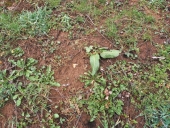
 2
2




 5
5




 1
1





 1
1




 1
1




 1
1




 3
3




 1
1




John Polk wrote:To start with, I do not know if the fruits are actually ever sprayed. I'm guessing not.
If in doubt, I would suggest burning them. Lemon peel ashes are second only to banana skin ashes in K (potash).
Lemon peel ashes are 31% K (compared to banana skins 41%).
Any citrus rind ash is a great source of potash.
 3
3





I make a Maple Syrup instructional movie! Check it out HERE
SKIP books, get 'em while they're hot!!! Skills to Inherit Property
See me in a movie building a massive wood staircase:Low Tech Lab Movie
 1
1




 2
2




Forever oscillating between wondering how I can fit everything I want to grow into my tiny urban garden (hahaha I can’t) and how to make enough money to buy my dream mini farm where I can grow everything I want to grow, raise chickens and be a haven for my local pollinators and wildflower species 😁🌱🌻
 3
3




pax amor et lepos in iocando

|
Popeye has his spinach. I have this tiny ad:
Learn Permaculture through a little hard work
https://wheaton-labs.com/bootcamp
|



